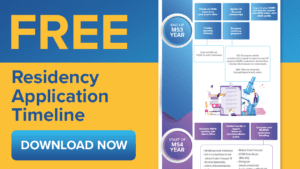How to Maximize Your Chances of Matching With Your Dream Residency
- by
- Jan 05, 2023
- Reviewed by: Amy Rontal, MD

You’ve found your dream residency program. Now, you just need to get accepted! The following post is a realistic guide to improve your chances of residency matching, set a reference point if you are still figuring out which specialty to pursue, and explain where to focus your limited time and effort. You’ll find these tips most helpful if you are still in your preclinical years of medical school with ample time to contribute towards your application, though others can surely still benefit from it.
While residency programs and medical specialties vary from year to year, the overall picture remains the same—dermatology and surgical subspecialties remain among the most competitive. It’s important to be able to understand what it takes to match into a competitive residency and gauge your likelihood of matching with your desired program based on your exam scores and other application criteria. At the end of this post, you’ll see some examples of students who may resonate with your situation.
Recognize that your application will be looked at thoroughly once selected, but it must first make it through a less rigorous screening process. Once you’ve made it through, you are part of the fortunate few as less than 20% of applicants receive an interview slot. Take it slow, be thorough and understand the following factors that are pivotal in screening applicants for a residency interview.
5 Ways to Improve Your Chances for Residency Matching
Goal #1: Make the score cutoff.
Residency programs are overrun with applications each year. Thousands of graduating MDs and DOs apply for hundreds of spots. As a result, programs have standardized filters that remove lacking applications early on.
Of these, the quickest way to lose your interview spot is by falling short of the program’s exam score cutoff. Keep in mind that it’s nothing personal—program directors simply cannot read through thousands of personal statements, recommendation letters, and resumes only to then decide on a few dozen to interview. Logistically, it is easier for programs to have applicants meet the minimum score criteria to be deemed eligible, and only then thoroughly examine their applications.
Thus, the first stage of the sieve is USMLE/COMLEX scores, a simple and objective measurement of students across the country. Since USMLE Step 1 is now pass/fail, a large onus is placed now on Step 2 CK. Of course, exam scores alone do not complete a physician, but programs would rather take the chance and admit a high-scoring applicant over a lower-scoring one. Furthermore, there is enough correlation between performance on the USMLE/COMLEX exam and your licensing board exam.
In other words, improving your Step 2 CK scores is paramount because if you don’t meet the cutoff, your application will likely be skipped over.
On a more positive note, each program assigns a different value to board scores. Higher national exam scores can further improve your spot on the rank list and can make up for a lackluster application. There are threshold scores above which you are nearly guaranteed an interview. To size up how you stack against the competition, check out this valuable data from the National Residency Matching Program (NRMP). From this, you can see that the average applicant who matched into, for instance, neurosurgery scored a 252 on USMLE Step 2 CK. So, if you plan to apply for neurosurgery, you need close to that score, staying within 10 exam points to be on the safe side and your application will make it through the score screening process.
Lastly, performing well on the exam isn’t just for the application as the information on Step 2 CK will reinforce your knowledge. Preparing for it will help you manage patients in various clinical settings and further build your medical acumen.
Though USMLE/COMLEX scores should be the priority, there are a few students each year who match into highly competitive residencies with below-average specialty scores. Let’s venture out at other factors in play.
Goal #2: Earn honors-level performance in clinicals.
Residency programs value clerkship grades almost as much as standardized exam scores. Mastering clinical rotations, especially your core rotations, takes more than just test-taking ability. To honor your clerkships, you must work well with others, show initiative, teach your team, and ultimately provide exceptional patient care. Your rotation grades are not only a filter as to whether you will get an interview, they are also heavily weighted when programs rank applicants on their match list.
Both you and your program are aware that honoring clerkships takes a good attitude, strong work ethic, communication skills, and superb medical knowledge (remember you still need to ace the shelf exam). Doing so will demonstrate to program directors and staff that you have the capabilities to perform in residency. It’s critical to prepare for each rotation and create a study schedule for shelf exams, even while balancing busy work hours.
Goal #3: Obtain strong, personalized, and timely letters of recommendation.
Once you’ve completed your core rotations, shift your focus to electives and obtain strong, personalized ERAS letters of recommendation, including the MSPE dean’s letter. Keep in mind that this is particularly important for highly competitive specialties.
Additionally, it’s important to realize that most applicants have higher chances of matching to their home program. If the program director and ancillary staff know that you are a strong candidate and have seen your clinical performance personally, they will likely favor you over another similar applicant they have no experience working with.
This is why away rotations are vital, as it provides you direct interaction with faculty there, giving you an opportunity to show your worth and prove that you can excel in that environment. While on your aways, interact and build relationships with various faculty and ask early for personalized letters of recommendation. Even for those who do not ultimately write a letter, having faculty in your corner may help during the application process. This is especially true if you apply to a smaller program or field, where faculty are familiar with one another. Remember that a simple word-of-mouth recommendation goes a long way.
The letters of recommendation are not limited to your clinical rotations. Seek out any attending you have a professional, positive and lasting connection with whether it was through research, activism, or volunteerism. These faculty advocates are most impactful when they have prolonged direct contact with you. Think about how impactful and personalized your letter will be with your research PI who you have worked with for two years, published with, and presented at conferences with. That contact would truly be able to speak about your diligence, analytical skills, and how any program would be lucky to have you.
There is no substitute for personal connections, so you need to start the process and build relationships early on in your medical school career. Ask upperclassmen or join interest groups, as often these are great places to start seeking faculty mentors. Naturally, use letters of support from faculty in your field of interest.
Goal #4: Shift gears toward research.
Beyond your board scores, recommendation letters, and rotation grades the next piece of the puzzle is to exhibit academic accomplishment in your desired specialty, aka research.
Participating in research signals your interest and commitment to the field. This makes you particularly attractive for academic programs and is essentially required for competitive specialties. For many, it is now standard to demonstrate extensive research experience prior to applying. The ideal applicant would have quality research—first-author publications or presentations at national conferences—as well as quantity.
This will not happen in a day, a week, or a month. These projects likely take years so start once you have an idea of your specialty, especially if it’s one of the more competitive. Seek a mentor early in your career and begin working on research-related projects. Even if you change your mind, research experience in another field will not hurt you.
Furthermore, generalize the research. If you enjoy both oncology and ENT, perhaps research in head and neck cancers may suit your fancy. As for the ERAS application, as long as the research is in progress, you can list it in your application. Program directors realize that the road to publication is a long one and the time between submission and presentation can take months.
Looking at the NRMP official match data, you can see firsthand that there is a stark difference in the total number of research items between those seniors who matched and those who didn’t.
A well-rounded application can only help. It was true when you applied for college and medical school, and it is true now as you apply for residency. Keep in mind that your application along with your extracurriculars should paint a picture of who you are, and make the reader want to interview you to learn more. If you are a leader, highlight your leadership experience. If you are a voice in your community, make your acts of community service known via your application. Emphasize the aspects of your application that would make you a great fit for your dream program. Depending on your involvement and the program’s cornerstones, this can include research, community service, or anything in between.
Goal #5: Stand out with your application.
Include something interesting or unique in your application. For instance, I recall an application I reviewed where the student created a vaccine information network for his small Latvian community in his hometown, which has since expanded to include various Eastern European communities. Talk about a WOW factor!
Getting into your dream residency can be stressful—I was there not too long ago and we went through the couples match! The key factors that contribute to your strength as an applicant are listed for you above. It is important to start early and be intentional. Intelligently approach your application and spend your time and effort wisely to improve your match chances.
Get involved in interest groups or research for your desired field early on. Then, prioritize scoring high on Step 2 as well as your clerkship rotations. Churn out the research publications and think about who you want to ask for letters of recommendation. Set yourself up for success!
Starting your residency application can feel daunting, with a multitude of aspects to consider and the pressure to do well. If you’re applying to residency soon and aren’t sure where to start, download the FREE Residency Application Timeline to stay on track and make sure your top programs receive your very best residency application!
What Is Your Likelihood of Matching With Your Top Program?
Consider the three applicants below—which one most closely matches your situation? Though they are fictional, I encounter similar applications every year and my recommendations are very much real.
Student 1
Desired specialty: Ophthalmology
Timeline: Beginning of MS3 year
USMLE Step 2 CK score: 265
Clerkships: 5/8 honors, 1/8 high pass, 2/8 pending
Letters of recommendation: One letter from the ophthalmology attending he has worked with since MS1 year, who is also the mentor for his ophthalmology interest group. He also plans to ask his research PI for the second letter of recommendation and has an away elective in the coming months, where he plans to score a third letter.
Research experience: Four first-author publications in well-known academic journals, and is currently involved in two additional projects with two pending submissions to a national conference
Other application criteria: Ophthalmology interest group VP, completed his MBA prior to starting medical school, plans to apply to AoA and is a possible candidate for Gold Humanism Honor Society
Student 1 is killing it! He is shooting well under par in all categories. This student should continue to excel on away rotations and score those all-important rec letters—ideally two for your field of interest (in this case, ophthalmology). Furthermore, work to honor the last few core clerkships, which means he will have to score well on the shelf exams.
Overall, this student has an extremely strong application. His research is impressive as he already has first-author publications and is awaiting his conference submissions. With the AoA and Gold Humanism cherries on top, he will likely be given multiple interviews and have a high likelihood of matching with his preferred residency program as long as he interviews well. Lastly, I would advise this candidate to have a letter of recommendation ready as backup, in case one of his initial writers fails to complete it in time.
Student 2
Desired specialty: ENT
Timeline: September 1st of MS3 year
USMLE Step 2 CK score: 247
Clerkships: 3/8 honors, 4/8 high pass, 1/8 pass
Letters of recommendation: One letter from his Sub-I internal medicine rotation
Research experience: One first-author publication, three papers pending publication, currently not involved in other research projects
Other application criteria: Various leadership positions and volunteering experiences related to the field of ENT, led an initiative to check for oral cancers in low income populations at his medical school
Get those letters of recommendation. It is September 1st, just weeks before ERAS submission. Writers, no matter how much they love you and want to help, still need time to write a personalized letter of support. This candidate needs to submit at least one letter of recommendation from an ENT, ideally two.
The applicant’s Step 2 CK score is a few points lower, and clerkship merits are low for the specialty as well. Despite this, the application is interesting and the unique experiences exhibit the applicant’s strong interest in the field. Overall, chances are fair that this student will receive a low to moderate amount of invites. Connect with a residency counselor to have some mock interviews and with enough preparation and solid interviews, this applicant has a decent chance to match into the specialty, though it likely will not be his first choice program.
Student 3
Desired specialty: Neurosurgery
Timeline: End of MS2
USMLE Step 2 CK score: 229
Clerkships: 2/8 honors, 1/8 high pass, 3/8 pass, 2/8 pending
Letters of recommendation: none acquired, but has two in mind
Research experience: Three publications, currently on one project
Other application criteria: Member of the NSGY interest group
There’s no sugarcoating it. This student should strongly consider a different specialty—something less competitive than neurosurgery, perhaps neurology or psychiatry. With subpar scores and clerkship grades, this student’s application will likely be filtered out on scores alone. My advice is to start looking into electives or other aspects of the medical field where you have an interest or can see yourself building a career and pursuing that. Unfortunately, neurosurgery is likely out of grasp for this applicant.
If you find yourself in a similar position where you need additional support with your residency application, don’t worry! You may consider a free consultation with a residency consultant who can help you set your application apart and ensure you maximize your chances of residency matching.
Best of luck on your road to residency!
About the Author
Mike is a driven tutor and supportive advisor. He received his MD from Baylor College of Medicine and then stayed for residency. He has recently taken a faculty position at Baylor because of his love for teaching. Mike’s philosophy is to elevate his students to their full potential with excellent exam scores, and successful interviews at top-tier programs. He holds the belief that you learn best from those close to you in training. Dr. Ren is passionate about his role as a mentor and has taught for much of his life – as an SAT tutor in high school, then as an MCAT instructor for the Princeton Review. At Baylor, he has held review courses for the FM shelf and board exams as Chief Resident. For years, Dr. Ren has worked closely with the office of student affairs and has experience as an admissions advisor. He has mentored numerous students entering medical and residency and keeps in touch with many of them today as they embark on their road to aspiring physicians. His supportiveness and approachability put his students at ease and provide a safe learning environment where questions and conversation flow. For exam prep, Mike will help you develop critical reasoning skills and as an advisor he will hone your interview skills with insider knowledge to commonly asked admissions questions.










